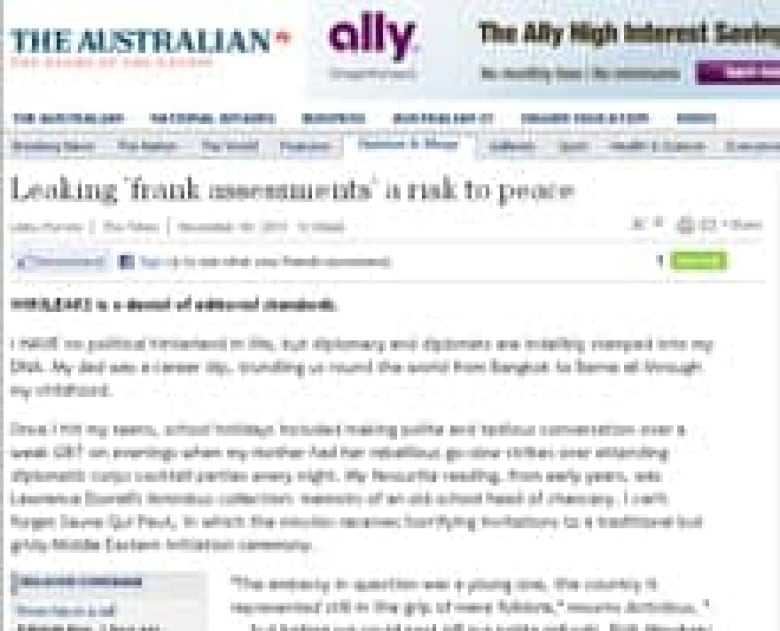WikiLeaks media round-up: Illuminating revelations, political tittle-tattle
Chattering gossip? A peek into the inner workings of American foreign policy? A fatal blow to trust? These were the takes of journalists around the globe in their analyses of the WikiLeaks disclosure of sensitive diplomatic cables. Here is a round-up of editorials and columns that examine what the release revealed.
ON ACCOUNTABILITY
The New York Times
The Decision to Publish Diplomatic Documents

"For The Times to ignore this material would be to deny its own readers the careful reporting and thoughtful analysis they expect when this kind of information becomes public.
"But the more important reason to publish these articles is that the cables tell the unvarnished story of how the government makes its biggest decisions, the decisions that cost the country most heavily in lives and money. They shed light on the motivations — and, in some cases, duplicity — of allies on the receiving end of American courtship and foreign aid. They illuminate the diplomacy surrounding two current wars and several countries, like Pakistan and Yemen, where American military involvement is growing. As daunting as it is to publish such material over official objections, it would be presumptuous to conclude that Americans have no right to know what is being done in their name."
ON RESPONSIBILITY
The Guardian
US embassy cables: The job of the media is not to protect the powerful from embarrassment

Jenkins dismissed U.S. claims that the leak would endanger lives, suggesting the State Department had been given a sufficient amount of time to place potentially vulnerable people in new locations.
"Clearly, it is for governments, not journalists, to protect public secrets. Were there some overriding national jeopardy in revealing them, greater restraint might be in order. There is no such overriding jeopardy, except from the policies themselves as revealed. Where it is doing the right thing, a great power should be robust against embarrassment."
ON DIPLOMACY
The Independent
These leaks could deal a fatal blow to global trust

"What will be damaging in the WikiLeaks, then, will be revelations about views on the part of senior political figures about individuals or nations who may be able to retaliate, or when the cultivation of personal trust is essential in progressing whatever interests may be in play. This will apply particularly in relation to states which have an elevated sense of national honour and, more generally, to the Muslim world. Afghanistan, Iran and Pakistan spring immediately to mind."
ON TITTLE-TATTLE
BBC

"For the rest, there is the usual and expected personal and political tittle-tattle that gives more than a glimpse of the day-to-day work of diplomacy whose honeyed public words normally seek to hide the acidity of real opinions.
"Everybody in the business knows this goes on and if they are shocked they have no business being in diplomacy.
"The only unusual thing is that this kind of stuff has been made public now instead of everyone having to wait years before the cables are formally released. Putin as an "alpha-dog"? Sarkozy as the "emperor with no clothes"? Embarrassing? Maybe. Damaging? Hardly."
ON TRANSPARENCY
Newsweek

"The problem the State Department faces now is not just the difficulty of having frank conversations with allies or secret negotiations with enemies who think — who know — it leaks like a sieve. It will also be harder to have frank exchanges within the United States government itself. To avoid this kind of massive leak in the future, documents will get higher classification and less distribution, and a lot of the most important stuff may not be committed to the keyboard at all.
"As a former U.S. ambassador in some of the Middle East's most sensitive posts wrote me (privately) this morning: "The consequence will be even less written reporting and communication — a disaster if you ever want to reconstruct what happened. It is already bad and now will be even worse. Everyone (or those in the know) will be passing info verbally. Ever play that whisper game as a kid?" He means the one where you pass a message from mouth to ear and discover it's utterly distorted at the end of the chain. "Yep!" he wrote, that's what internal communications are going to be like."
ON THE FRANK EXPRESSIONS, MEDIA ETHICS
The Australian
Leaking 'frank assessments' a risk to peace

"[Diplomats] need to talk it out, to report it, and at times to express themselves with enough force to make a domestically distracted government back home take notice.
"If the words "thug," "corrupt", "unstable" and "inadequate" do get used in connection with certain supposedly friendly regimes — that's part of the job. If they just said "strong," "inventive," "idiosyncratic" and "charming," as they might in face-to-face meetings, nobody would take any notice and their home governments would remain unwarned."
Purves also criticizes the media, saying the decision to publish the files was professionally unethical.
"Responsibility to check, to offer a chance of reply, to accept and publish claims about the context of a troublesome statement (however far-fetched and ridiculous the excuse). Sometimes the keenest editor decides to withhold a revelation during a tense period, and keep it for a more balanced history later.
"For an editor to take responsible care does not make him or her an establishment stooge or a coward; even the British satirical magazine Private Eye sometimes learns things it does not immediately publish."